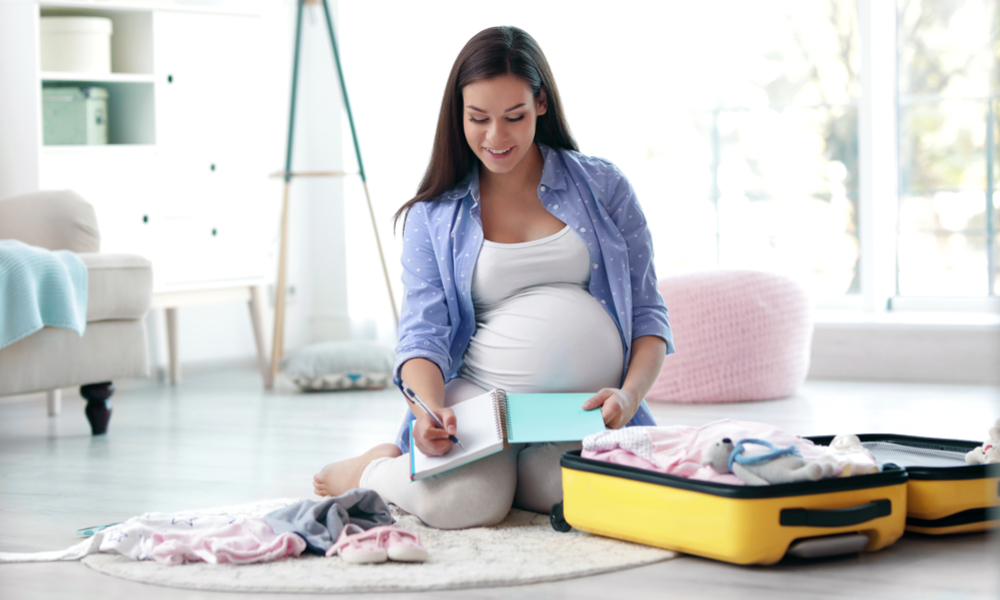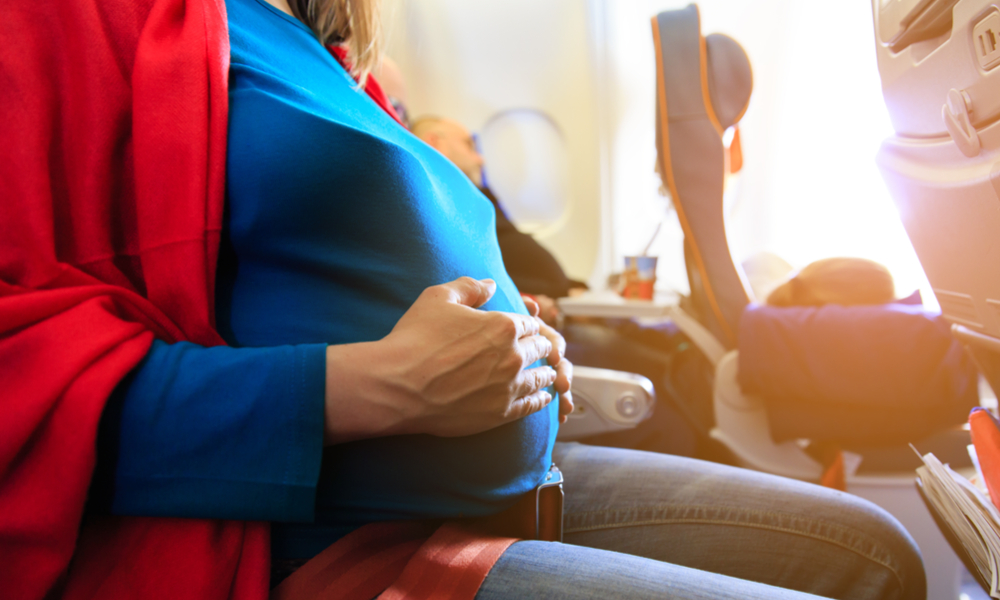This post was last updated on September 1, 2023.
Heading out on a babymoon? Squeezing in a last hoorah with pals? Fitting in that business trip that could make or break your career? If you’re one of the mommies-to-be getting ready to jet off on a trip before your new bundle-of-joy joins your family, you probably already know that you’ve got some prepping to do for that flight. While that baby bump of yours may bring you much joy, it also might be the cause of some serious challenges when it comes to air travel.
From swollen feet to salty cravings, traveling while pregnant comes with a lot of extra precaution, but with just a little careful planning and some thoughtful provisions, you’ll be on your way to having the trip of a lifetime. Before booking those cheap flights for your next trip, check out some of our top tips to ensure that you and your baby stay safe and healthy in the sky!
Before You Go:
Best time to fly
Just because you can fly during your first trimester, doesn’t mean you should. While not prohibited, flying in this period of your pregnancy is brutal and here’s why: early symptoms like morning sickness and exhaustion worsen on flights…especially if you’re someone who is prone to motion sickness. Yikes!
Most doctors will tell you that if you have a choice, the ideal time to fly is during your second trimester. And we’re here to tell you that you should listen to them. By trimester two, you’re past the morning sickness, your body is better adjusted to all the hormonal changes, and you haven’t quite hit the fatigue coming your way in your third trimester. Remember: the cut off for flying while pregnant is thirty-six weeks (thirty-two if you’re carrying multiples) for normal, low-risk pregnancies, so try to stick to traveling between week fourteen to twenty-eight of your prenatal period.
What’s up, doc?
Before your trip, pay your physician a visit and ask for the documentation stating your expected date of delivery, doctor’s contact information and blood type. Some airlines also require expecting mommas like you to have a medical certificate signed by a physician or midwife, which states that you are okay to travel (you’ll see more reasons below). If you’re traveling internationally, be sure to ask your doctor about what, if any, vaccinations are needed for your journey and load up on the prescriptions or medications you’ll need to prevent any illnesses.
Pack like a prenatal pro
Pack a copy of your prenatal records. Remember those documents you asked your doctor for from the tip above? Yep, those are the ones you should take with you and have handy throughout your trip. Refresher: these include information about your due date, blood type, blood pressure, and ultrasound results. Whether you’re traveling domestically or internationally, if you wind up needing to go to a hospital, having your records on hand can save a lot of time. Not only will you avoid having to make multiple phone calls to retrieve your information, but you might even be able to skip some of the blood work, ultrasounds, and other tests so you can get the care you need faster.
Carry snacks with you. Although airlines will almost always have some food options for free or for purchase, there’s no guarantee those options will be good or healthy ones. Bring some nutrition-packed snacks like granola bars and trail mixes; they travel well and are more likely to satiate your hunger quickly and far more healthily than chips or other high-sodium snacks.
On the Flight:
Choose the right seat
Mommas-to-be, listen up! When it comes to reserving a seat, always go for an aisle seat. Not only will it be easier to get up and go for those frequent bathroom trips, but you’ll also have the ability to stretch your legs out in the aisle as often as you need without having to climb over your seatmates or be in anyone’s way. If you can’t reserve ahead, arrive at the airport early to ensure you get the seat you need or have time to ask and potentially swap with a fellow passenger. And don’t be shy! At check-in, notify the airline attendant that you’re pregnant and ask if you can possibly get an upgrade or get a seat with a couple of open seats next to you. You’ll be surprised at how accommodating they’re willing to be for your comfort!
Ask to board early
If your airline doesn’t automatically announce expecting mothers to board along with the other early bird passengers (elderly, first class, traveling with small children, etc.) then just ask! Aim to get to your gate a few minutes earlier than you usually would and ask the staff there if you are allowed to hop on board the plane before the masses. Not only does this allow you to take your time and walk slow and unrushed on to the aircraft, but you’ll also have more time, and likely some assistance, to store your bags overhead.
Don’t dress to impress
If you’re already worried about being uncomfortable on the plane, the last thing you want is to add to the discomfort by wearing the wrong garb. Choose clothing that is loose and comfortable and be sure to layer, so you can stay cozy no matter how cold the plane gets or how many hot flashes you experience. Don’t forget proper foot gear! Your feet may swell inflight, so wearing compression socks will promote blood circulation. Similarly, shoes can get tight and painful, so pack a pair of slippers (yes, they can be ruby slippers if you’d like) to walk around in on the aircraft.
You Might Also Enjoy: Flying with a Baby for the First Time? Your Questions Answered
Treat yourself
Got a bunch of points piling up? Now might be the best time to use them. Last hoorah before the kiddo comes? Go ahead and splurge a little (especially on longer flights). Why? Well, between potentially swollen feet, back pains and the frequent bathroom trips, upgrading your seat to first class or business class might be just what you need to turn that flight from bad to rad. Your body is doing A LOT of work right now, so it deserves all the TLC it can get! The extra leg room, close access to restrooms and quick service will make flying a much better experience. Trust us on this one — you’ll thank us later!
FAQs:
Q: Can I travel during my third trimester?
A: While some airlines allow travel up to 36 weeks, it’s generally recommended to avoid long trips during the third trimester due to increased risks and discomfort.
Q: Should I purchase travel insurance?
A: Yes, travel insurance can provide coverage for unexpected medical situations or trip cancellations. Make sure the policy covers pregnancy-related issues.
Q: Is it safe to use public transportation?
A: Public transportation is generally safe during pregnancy. However, choose seats with proper support and avoid overcrowded areas.
Q: Can I travel if I have a high-risk pregnancy?
A: It’s advisable to avoid travel if you have a high-risk pregnancy. Consult your healthcare provider for personalized guidance.
Q: How can I stay comfortable during long flights?
A: Stay hydrated, move around periodically, and use cushions or pillows to support your body. Compression socks can help prevent swelling.
Q: Are road trips safe during pregnancy?
A: Road trips can be safe if you take regular breaks, stay hydrated, and wear your seatbelt correctly. Plan your route with rest stops in mind.
Do you have any travel tips for moms-to-be? Let us know in the comments below!






